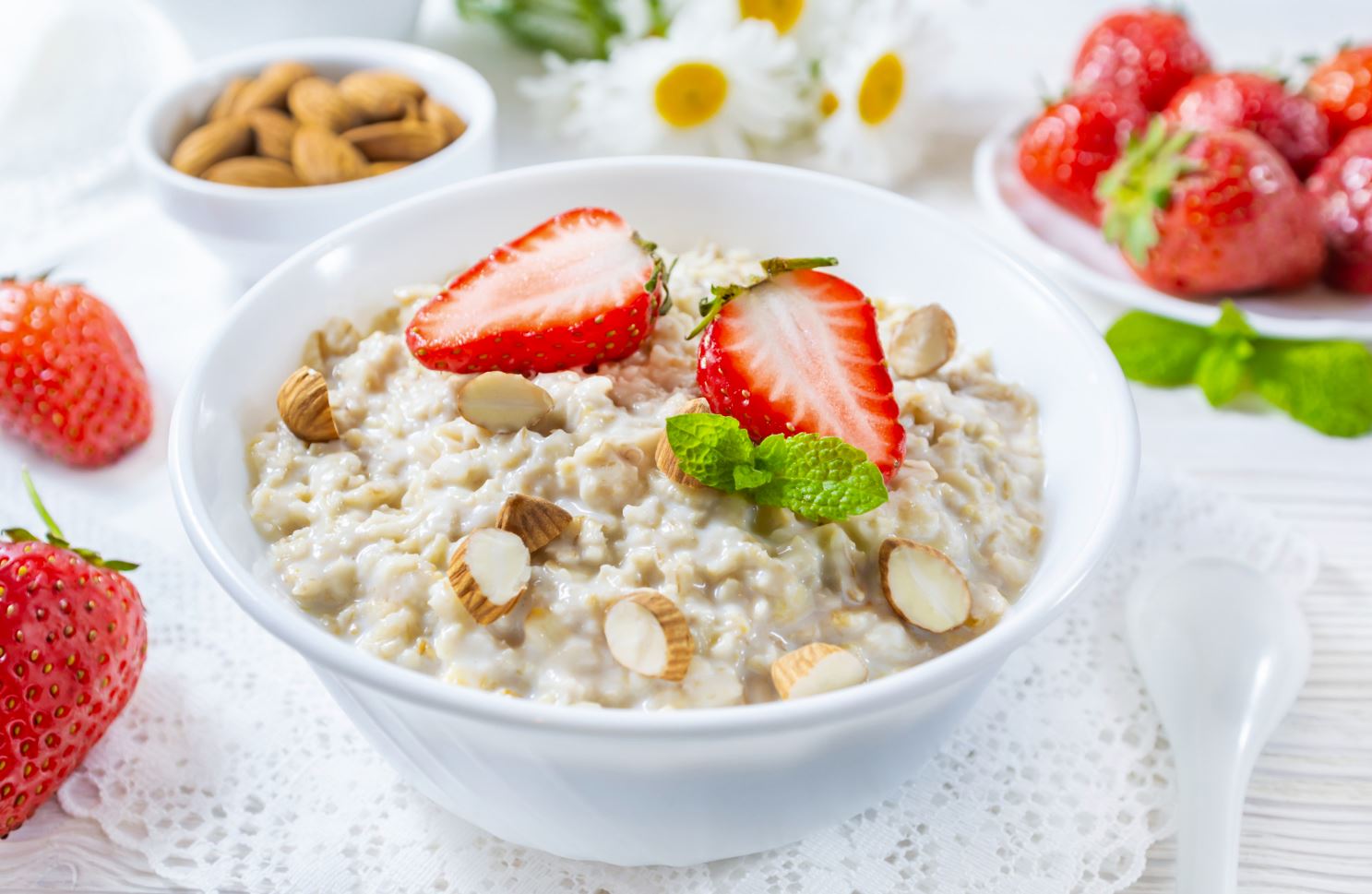The Health Benefits of Eating Oatmeal Every Day

If you’ve ever had breakfast with a healthy food enthusiast, you’ve probably seen oatmeal on their plate. Soaked overnight, baked into muffins, or blended into waffles - this versatile food offers endless meal options. It’s no wonder, then, that oatmeal has lately become one of the most beloved healthy dishes. But do oats really deliver on the promise to improve our health? Let’s find out more about what happens when you eat oatmeal every day.
Should You Eat Oatmeal Daily?
Oats are a nutritious whole-grain food packed with vitamins, minerals, and fiber. Eating oatmeal can help regulate blood sugar, lower cholesterol levels, and improve your skin health. Besides, it is a very filling meal that will keep your hunger at bay if you are on a weight loss journey. On top of that, you can have it in many shapes (granola bars, cookies, muffins) and combine it with various toppings (fruits, nuts, or yogurt) to keep your meal flavorful.
Indeed, oatmeal is one of the healthiest breakfast options on the market. Provided that you consume it in moderation and don’t neglect other nutritious dishes, you can feel numerous health benefits of eating a bowl of oats with milk every morning.
5 Benefits of Consuming Oats Every Day
1. Oats Are Powerful Antioxidants
Oats can have a significant antioxidant effect on your body due to their high levels of polyphenols. Moreover, they contain a rare group of alkaloids called avenanthramides, which can be found in almost no other food.
Studies have found that avenanthramides can increase the production of nitric oxide gas, which leads to better blood flow and lower blood pressure levels. Additionally, they have anti-inflammatory and anti-itching effects.
2. Oats Can Reduce Cholesterol Levels
High blood cholesterol is one of the main risk factors for the leading cause of death worldwide - cardiovascular disease. Oats contain beta-glucan, a type of soluble fiber that is scientifically proven to reduce both bad and total cholesterol levels. By increasing the release of bile acids, the beta-glucan fiber reduces the circulation of cholesterol in the blood.
Furthermore, oats can prevent the oxidation of bad cholesterol (LDL). This is another essential step towards lowering the risk of heart attacks, strokes, heart tissue damage, and artery inflammation.
3. Oats Can Lower Blood Sugar
Oats are especially beneficial for individuals struggling with type 2 diabetes or obesity. The beta-glucan fiber found in oats can delay the absorption of glucose, which leads to the effective reduction of blood sugar levels.
Additionally, beta-glucan can help type 2 diabetes patients by increasing insulin sensitivity.
4. Oats Are Significantly Nutritious
Oats have a well-balanced nutrient composition. Consuming oatmeal is incredibly beneficial to our health because this dish is a source of fiber (including beta-glucan fiber) and carbs.
This whole-grain food is loaded with healthy components, such as vitamins, minerals, and antioxidant plant compounds. Moreover, oats are a great source of essential amino acids and high-quality proteins.
5. Oats Can Promote Weight Loss
Oatmeal is simultaneously a tasty and very filling food. Therefore, including it in your daily menu can help you consume fewer calories throughout the day and reach your weight loss goal.
The beta-glucan found in oats encourages the release of a satiety hormone (peptide YY) responsible for reducing calorie intake and preventing obesity. This fiber can delay the time your stomach needs to empty of food, which causes a feeling of fullness and decreases appetite.
Is Oatmeal Good For Reducing Belly Fat?
Oatmeal is a great meal choice for people who aim to lose weight because it can help reduce belly fat rapidly. Since oats are rich in fiber, this food can keep your stomach full for a long time. Eating a bowl of oats with different toppings on an empty stomach in the morning helps weight loss in the long run by controlling appetite.
According to a 2013 study in Plant Foods for Human Nutrition, oatmeal can prevent abdominal fat distribution. The research data in this study shows that the regular consumption of beta glucan-containing oat cereal helped participants reduce their body fat and waist-to-hip ratio.
Is Eating Oats Good For Your Skin?
Oats are a rich source of essential nutrients that can contribute to healthy skin. They contain avenanthramides, which are antioxidant and anti-inflammatory compounds that can help to soothe and protect the skin. Additionally, oats are high in beta-glucans, which have been shown to improve skin health by enhancing moisture retention and reducing itching and inflammation. The presence of vitamins and minerals such as zinc, copper, and vitamin E in oats also supports overall skin health.
Anti-Inflammatory Properties
The anti-inflammatory properties of oats can benefit the skin by reducing redness, itching, and irritation. This can be particularly helpful for individuals with sensitive or eczema-prone skin. Consuming oats may help to alleviate these symptoms from within, promoting a healthier complexion.
Moisturizing Effects
Oats can act as a natural moisturizer when consumed regularly. The beta-glucans in oats form a fine film on the surface of the skin, helping to lock in moisture and protect the skin from external irritants. This can contribute to a more hydrated and supple complexion.
Protection Against UV Damage
Some research suggests that the antioxidants present in oats may offer protection against UV-induced skin damage. While oats should not be considered a replacement for sunscreen, incorporating them into a balanced diet may provide an additional layer of defense against environmental stressors.
Improvement of Skin Conditions
For individuals with certain skin conditions, such as acne or eczema, consuming oats may have a positive impact. The anti-inflammatory and antioxidant properties of oats could potentially help in managing these conditions from within, complementing external skincare efforts.
Does Oatmeal Help Hair?
Oatmeal has long been considered a versatile and beneficial ingredient for overall health and well-being. However, many people may not be aware of the numerous benefits it can provide for hair health in particular. Therefore, let’s explore the various ways in which oatmeal can help improve the condition of your hair.
Promotes Hair Growth
One of the primary benefits of using oatmeal for hair is its ability to promote hair growth. Oatmeal contains a wealth of essential nutrients, such as vitamins, minerals, and antioxidants, which can nourish the hair follicles and stimulate growth. Additionally, oatmeal contains a compound called avenanthramides, which has been shown to help reduce inflammation and improve blood circulation in the scalp, further supporting hair growth.
Reduces Dandruff and Itchiness
Dandruff and itchiness are common issues faced by many people, and oatmeal can provide relief for these conditions. The anti-inflammatory and antifungal properties of oatmeal help to combat the yeast-like fungus responsible for dandruff, while its natural exfoliating properties can remove dead skin cells and reduce flaking. By incorporating oatmeal into your hair care routine, you can experience relief from dandruff and itchiness.
Strengthens Hair
Oatmeal is rich in essential nutrients that can help to strengthen and repair damaged hair. The presence of vitamins, minerals, and antioxidants in oatmeal can nourish the hair shafts and provide the necessary building blocks for strong, healthy hair. Additionally, the proteins present in oatmeal can help to rebuild the hair’s natural protein bonds, further contributing to its strength.
Adds Shine and Softness
Oatmeal can also help to add shine and softness to your hair. The natural moisturizing properties of oatmeal can help to lock in moisture, preventing dryness and brittleness. This can lead to smoother, more manageable hair that is less prone to breakage.
Prevents Hair Damage
By strengthening and nourishing the hair, oatmeal can help prevent hair damage related to factors like heat styling, chemical treatments, and environmental stressors. Regular use of oatmeal treatments can help to maintain the health and vitality of your hair, reducing the likelihood of damage and breakage.
Do Oats Count as Carbs or Protein?
The nutritious benefits of oatmeal are primarily linked to its status as a high-carb food. However, oats also contain a considerable amount of quality protein. The major legume-like protein found in oats, avenalin, is found exclusively in this food. The carb-to-protein ratio in oatmeal may vary depending on the type of oats and their preparation.
When Should We Consume Oats?
You can enjoy oatmeal at any time of the day that suits your personal schedule and dietary goals. For example, taking an overnight oatmeal or oat-based smoothie first thing in the morning helps you sustain your energy throughout the day. You can also have a granola bar or an oat-based cookie as a quick snack for a perfect energy boost in the middle of a stressful day at work.
Oats are also the go-to food for every fitness enthusiast. They provide your body with the carbs required to maintain energy during heavy exercise or accelerate muscle recovery afterward.
Is There A Best Time To Eat Oatmeal?
The ideal time to enjoy a bowl of oatmeal can differ from person to person, depending on their unique tastes, dietary requirements, and lifestyle choices. Oatmeal is a versatile food that can be incorporated into your daily routine in various ways. Whether you savor it in the morning to kickstart your day with a burst of energy, indulge in it before a workout to fuel your physical activity, or relish it in the evening as a comforting meal, oatmeal offers endless possibilities.
For many individuals, oatmeal is a popular choice for breakfast. It is a filling and energizing meal that can provide a steady stream of energy throughout the morning. Packed with complex carbohydrates and fiber, oatmeal helps maintain a consistent level of energy. To make your breakfast even more nutritious, you can top your oatmeal with a variety of fruits, nuts, and seeds, creating a well-balanced and delicious start to your day.
Although oatmeal is commonly associated with breakfast, some people prefer to enjoy it in the evening as a light and comforting dinner option. Its high fiber content promotes a feeling of fullness, making it an excellent choice for those seeking a satisfying yet low-calorie meal or a late-night snack.
Furthermore, oatmeal can be consumed before a workout or any physical activity. The complex carbohydrates in oatmeal provide a sustained release of energy, making it an ideal fuel for your body during exercise. By adding a source of protein, such as Greek yogurt or milk, you can enhance its pre-workout benefits by supporting muscle recovery and growth.
Ultimately, the best time to enjoy oatmeal is entirely up to you and your individual needs. Some people find that starting their day with oatmeal helps them feel more energized and focused, while others prefer it as a post-workout recovery meal or a delightful evening treat. The choice is yours to make, so go ahead and savor the versatility of oatmeal in a way that suits you best.
Why Should I Eat Oatmeal At Night?
There are several specific benefits of eating oatmeal before bed. Here is why you should consider eating oatmeal at night.
Promotes Better Sleep
Oatmeal is rich in complex carbohydrates, which can boost the production of serotonin, a neurotransmitter that aids in relaxation and sleep regulation. Moreover, oatmeal also contains melatonin, a hormone that helps regulate the sleep-wake cycle, making it an excellent choice for a better night's sleep.
Sustained Energy Release
Oatmeal is a complex carbohydrate that provides a slow and steady release of energy. Consuming oatmeal at night can help stabilize blood sugar levels and prevent spikes and crashes in blood glucose, which can contribute to better sleep quality and sustained energy levels throughout the night.
Nutrient-rich
Oatmeal is a nutrient-dense food containing vitamins, minerals, and fiber. Consuming oatmeal at night can provide essential nutrients that support overall health and well-being.
Digestive Health
Oatmeal is high in soluble fiber, which can aid in digestion and promote a feeling of fullness. Consuming oatmeal at night may help prevent late-night snacking or overeating, leading to better digestive health.
Weight Management
As a filling and nutritious food, oatmeal can be part of a balanced diet that supports weight management. Eating oatmeal at night may help prevent excessive hunger or cravings, leading to better control of calorie intake.
What Makes Oats a Superfood?
As a 100% whole-grain food with almost no processing, oats are rightfully considered a natural superfood. A bowl of oats is packed with fiber, vitamins, and minerals. What makes this food special is its high level of beta-glucan, a soluble fiber almost exclusively found in oats. In addition, oats are high in protein and low in sodium.
Are Oats Really Good For You?
Oats are taking the healthy food world by storm for a good reason. Experts have confirmed that oatmeal has numerous benefits for your health. Whether you simply need a high-carb meal to get you through a long day or aim to reduce cholesterol levels, oatmeal is a great choice of food to start your day with.











